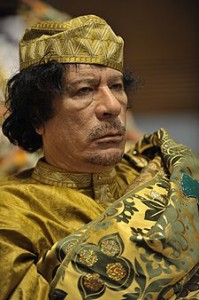Finding The Balance In Libya – OpEd
By Wim Roffel
Our Libya operation is getting out of hand. First we were told that the rebels were sure to win. Then they needed air support as Gaddafi was so evil to use his air fore against his own population. Then they needed also support against tanks and artillery. Already we are talking about training and arming the rebels. In the end we may even see the need for ground troops to get rid of Gaddafi.
For anyone who has followed Iraq or Yugoslavia this will sound familiar. There too we started supporting the enemies of an evil dictator and we ended up as parties in a civil war. There too our first actions seemed so innocent that we were never able to see how they connected to the later violence. What could be wrong with supporting the freedom loving Croats and Kurds?

What we overlook time and again is that at some point the conflict is no longer about disposing a dictator. Instead it has become an ethnic conflict. This happened when the Croats started to discriminate and cleanse Serbs and the Kurds did similar things with Arabs. Yet somehow we failed to understand that under these circumstances many Serbs or Arabs might prefer to support their dictator above the new order we were bringing.. Similarly, nowadays we are surprised that there is a tribal coalition that actually supports Gaddafi.
We can see this lack of imagination even in what our journalists write for us. When the Libyan rebels are portrayed we hear stories about murdered family members and destruction. But when supporters of Gaddafi are portrayed our journalists keep the same distance they would keep when interviewing neo-nazi’s. It is as if they fear to find that the other side might be human too and that their ideas might be contagious.
And so we end up supporting one side in a civil war. As the side that we support is initially the weakest its road to victory is bound to be long and bloody. Our insistence on total surrender of our adversaries makes this road even longer. We may even end up with the same situation as in Bosnia where at some point we had to conclude that we had created a rather bloody stalemate and that only further intervention combined with some openness for compromise could save the situation.
The effects of our partiality damage a country also in the long term. A good illustration is Iraq where we so identified with the oppressed Shiites that we robbed many Sunnites of their jobs with the de-Baathisation and the dissolution of the army. This harmed the country as a whole too. The abolition of the army contributed heavily to the following anarchy while the de-Baathisation replaced many competent people with less competent newcomers. It is no coincidence that nowadays Iraq finds it hard to supply its population with such basic services as reliable electricity.
A similar effect can be found in Kosovo where we allowed all Serbs to be cleansed from government jobs. Before the war there certainly had been discrimination against Albanians. But we are now more than 11 years later and Kosovo still doesn’t have reliable electricity despite massive investments by the international community. It would have been better if we had put more value on continuity and competence and less on repairing previous injustices.
In Libya the road is still open for a less extremist approach. We can aim for negotiations between the rebels and the opposition. This could result in less fighting and a less destabilizing transition. The price might be some guarantees for Gaddafi’s supporters and their tribes and an undisturbed pension for Gaddafi in some nice mansion in Sirte. It might also result in more power for tribal leaders than some Westerners might like.
Negotiating will not be easy. We will need to push the rebels who prefer total victory. We need to find a balance between pressure and building trust with Gaddafi. And some of our own “human rights activists” may be so focused on getting Gaddafi behind bars that they won’t see the benefits of an approach with less humanitarian costs.
No side can be trusted to be honest during an armistice. Gaddafi has already shown how he can ignore self announced armistices. The rebels look so disorganized that they may be even incapable of the necessary discipline. And the West showed itself untrustworthy when in the year before the Kosovo War it systematically ignored armistice violations by the KLA. This should not deter us. Armistices in other conflicts like the Vietnam War saw also many violations before the negotiations led to peace. Both armistices and negotiations are meant to build trust and that takes time.
Probably the best reason to choose negotiations is previous experience elsewhere in the world: foreign interventions in the long term seldom lead to more democracy while peaceful resistance and in its extension negotiations have much better results.
Wim Roffel a specialist in ethnic affairs and democratization and maintains the Balkan Outlooks website.
